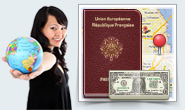
Living in Bahrain
Joyce Anne Agacer, Feb 28, 2005
CLIMATE
The climate is hot in summer and mild in winter. From November to April it is very pleasant, with temperatures from 15 to 24 degrees centigrade. Temperatures are coolest between December and March when northerly winds prevail. From July to September temperatures average 36 degrees centigrade with high humidity.The annual average rainfall is approximately 77 millimetres.The Arabian Gulf has an average depth of only 35 metres and most of it in the vicinity of Bahrain is much shallower than this.
GOVERNMENT
Form of government: monarchy (emirate)
Chief of state: Emir
Head of government: Prime Minister
The country is widely respected by the international community for its progressive policies and programs, thanks to the judicious leadership of His Highness and his wise government, led by His Highness Shaikh Khalifa Bin Sulman Al Khalifa, the Prime Minister and the continuous support of His Highness Shaikh Sulman Bin Hamad Al Khalifa the Crown Prince and Commander-in-Chief of the Bahrain Defence Force.
Apart from providing a stable government, it has been an active policy to encourage oreign investment and support private enterprise Bahrain became a member of the United Nations and the Arab League in 1971. In 1981 it joined its five neighbours - Saudi Arabia, Oman, Kuwait, the United Arab Emirates and Qatar - to form the strategic alliance called the Gulf Co-operation Council (GCC).
Also, Bahrain has an independent legal and judicial system with a framework of commercial laws and, on this strength and its well developed infrastructure, has become an international and GCC arbitration center.
ECONOMY

GDP: purchasing power parity - $11.29 billion (2003 est.)
GDP - real growth rate: 4.9% (2003 est.)
GDP - per capita: purchasing power parity - $16,900 (2003 est.)
GDP - composition by sector:
agriculture: 0.7%
industry: 42.1%
services: 57.2% (2003 est.)
Investment (gross fixed): 11.9% of GDP (2003)
 Ideally located at the confluence of ancient trade routes, Bahrain has always been a thriving entrepot with the economy traditionally driven by trade, pearl diving, fishing and agriculture.
Ideally located at the confluence of ancient trade routes, Bahrain has always been a thriving entrepot with the economy traditionally driven by trade, pearl diving, fishing and agriculture.
Petroleum production and refining account for about 60% of export receipts, 60% of government revenues, and 30% of GDP. With its highly developed communication and transport facilities, Bahrain is home to numerous multinational firms with business in the Gulf. The country is dependent on Saudi Arabia for oil granted as aid. A large share of exports consists of petroleum products made from refining imported crude. Construction proceeds on several major industrial projects. Unemployment, especially among the young, and the depletion of oil and underground water resources are major long-term economic problems.


